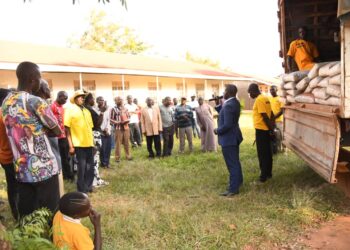A 40-year-old landlord, Francis Wandera, has been taken into custody at the CPS Jinja on charges of aggravated defilement of two minor girls, aged 2 and 5, who are daughters of one of his tenants.
The incident has sent shockwaves throughout Jinja City, sparking widespread outrage and condemnation.
Jinja City boasts an impressive number of places of worship, including mosques and churches, indicating a significant religious presence in the area.
According to Kiira Regional Police spokesperson, SP James Mubi, the victims revealed that Wandera bought them jolly jas juice and chapati before committing the heinous act.
The mother of the victims immediately reported the incident to the police, leading to Wandera’s arrest.
The police, under the command of SSP Charles Nsaba, have vowed to ensure the safety of all minors and residents by prosecuting Wandera to the fullest extent of the law, serving as a deterrent to potential child molesters.
The victims have undergone medical examination, and Wandera has been examined and deemed to be of sound mind.
This disturbing incident has left many in Jinja City, known for its strong sense of community and faith, reeling in shock.
The authorities are taking this case seriously, and it’s expected to be brought to court soon.
The judiciary has a history of handling similar cases, with records of past hearings and prosecutions available.
The community remains vigilant, demanding justice for the victims and their family.
Child abuse is indeed a significant challenge in Jinja, Busoga, and Uganda as a whole, manifesting in various forms such as child labor, negligence, torture, and sexual abuse and exploitation, often perpetrated by those entrusted with their care.
To address these issues, the Ugandan government has established the National Child Policy 2020.
This policy, authored by the Ministry of Gender, Labour and Social Development aims to coordinate efforts across different sectors to provide comprehensive services covering the four cardinal rights of the child: survival, development, protection, and participation.
Key Provisions of the National Child Policy 2020 include ensuring children’s basic needs are met, including access to healthcare and nutrition, providing opportunities for children’s physical, emotional, and cognitive growth and safeguarding children from violence, exploitation, abuse, and neglect.
The policy prioritizes family-centered care, emphasizing that children’s well-being depends on their families’ ability to care for and protect them. When parents can not provide care, the policy promotes family-based alternatives and community environments.
The 2016 review of the Orphans and Other Vulnerable Children (OVC) Policy (2004) revealed an alarming increase in child vulnerability in Uganda.
Notable factors contributing to this trend include family breakdown due to mistrust among couples, poor parenting practices, moral decadency, weakened extended family and community system support and household and community poverty, leading to failure to provide basic needs.
Experts and child rights advocates are concerned that despite the Constitution (1995) guaranteeing children’s rights to care and protection, thousands of Ugandan children continue to face violations of these rights.
Moreover, many more children remain inadequately protected against various risks, including abuse, exploitation, neglect, and violence.
In Uganda,aggravated defilement is considered a grave crime punishable by law with the maximum penalty of death by hanging upon convention.
Do you have a story in your community or an opinion to share with us: Email us at editorial@watchdoguganda.com














